
views
Playing Cricket Recreationally
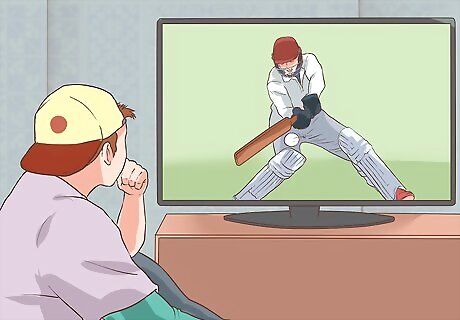
Learn to play cricket. If you don’t already know how to play, learn the basics before you join a team or play competitively. If you have friends that play regularly, ask them to explain the rules to you. Alternatively, watch professional games online or on TV to become familiar with the rules of cricket. Some alternative methods include: Watching informative videos online Getting a hands-on lesson by playing with a group of friends
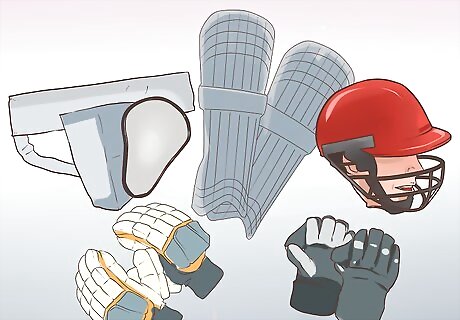
Gather your clothing and safety gear. First, purchase well-fitting cleats that will help you run faster. Next, purchase appropriate clothing. If you join a more serious team later, you may need to purchase a uniform. In the meantime, wear a polo T-shirt and long white trousers. Depending on your playing position, you may also need to purchase safety gear, including: Helmet Pads Gloves Chest guard Abdominal guard Thigh guards Arm guards Shin guards
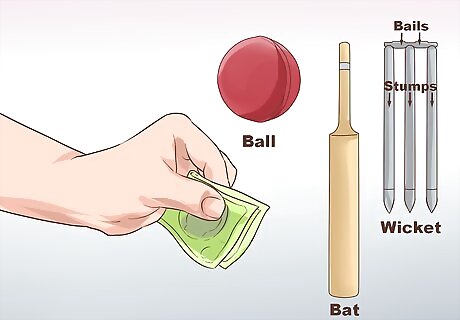
Purchase cricket equipment. Many teams and clubs provide cricket equipment for you. However, if you play with friends recreationally or start a team, you will need to purchase your own gear. You will need: 6 stumps or long white poles 4 bails that will rest on the poles 2 cricket bats 1 red cricket ball

Join an amateur cricketing club or play with friends. The easiest way to play cricket recreationally is to join a local cricket team hosted by your school or local community center. These teams will have equipment, playing fields, and certified referees. Alternatively, host your own cricket games with some friends to become a cricket player. However, you may have to bend the rules to accommodate your situation. For example: If you don’t have enough players to populate 2 teams, you may have to play a variety of positions throughout the game. If you don’t have the funds for cricket equipment, you may have to do without specialized safety gear. If this is the case, play with a soft ball to prevent injury. It may be difficult to find referees, especially if none of your friends volunteer for the position.
Improving Your Game
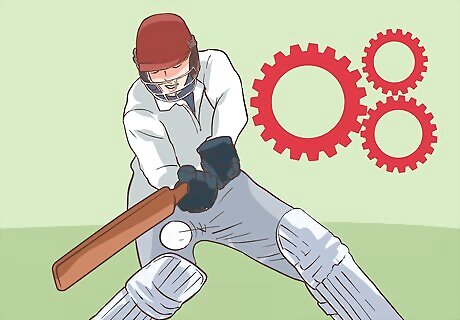
Practice often. The more you practice, the better you’ll get. The average professional cricket player only has 5 weeks off per year. That means that they’re training hard during the other 47 weeks of the year. If you want to be competitive, you have to train whenever you can. For example: Spend your weekends playing cricket with your team or with friends. Instead of watching TV when you get home from work, go for a run outside. Throw a ball around with your coworkers during your lunch break. Hit as many cricket balls as possible.

Get a coach. Utilizing a coach is expensive and time consuming. However, a coach will be able to help you improve faster than you ever could on your own. The more time you spend one-on-one with a coach, the better your cricket game will be. To find a coach: Ask your friends if they know any good coaches. Do an online search for trainers in your area. Ask around at a cricket event. Look for postings at your local cricket club.
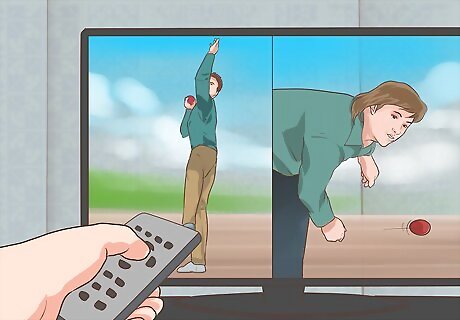
Watch the professionals play. Watch pro cricket games whenever you get the chance, whether it’s in person, on TV, or online. While you watch, examine the different techniques that your favorite players use. Do your best to absorb as much information as you can. Ask yourself: How do they react under pressure? How to they interact with their teammates? What techniques set them apart from their teammates? How might you reenact those techniques?
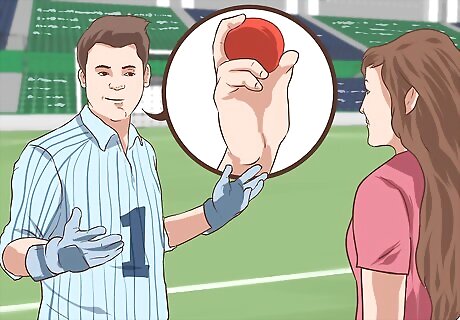
Talk to experienced players. Make an effort to become friends with the most experienced members of your club or team. Ask them for advice on improving your cricket game. If you go see a cricket game, stick around after the match ends and try to meet the players. Ask the players if they have any tips for a budding cricket enthusiast. If an experienced player gives you advice, follow it. There’s no point in asking for advice if you’re not going to take it. Don’t let your feelings get hurt. If an experienced player gives you harsh criticism, see it as an opportunity for improvement.
Playing for a University

Make a list of universities to apply to. Do a search online or talk to your school’s guidance counselor to decide which universities give you the best opportunity to play cricket. Additionally, look at the variety of academic programs offered by each school, the housing options, and the financial aid available. These criteria will help you narrow your choices down into a short list of 4 to 5 schools. There are 6 university cricket academies and 7 educational institutions throughout Wales and England that are part of the Marylebone Cricket Club University (MCCU) scheme. These schools offer the chance to further your academic career while playing cricket under top-level coaches.

Make sure you meet all the qualifications. If you’re looking at schools far enough in advance, you can work hard to meet qualifications that you may not meet otherwise. For example, if the schools you like require a high grade point average, work hard in all of your classes to raise your grades. For a list of applicant qualifications, look on the university website or talk to an admission counselor. Some other examples of qualifications include: Being involved in extracurricular activities at school Attending any university events to meet professors and show interest Doing a lot of community service
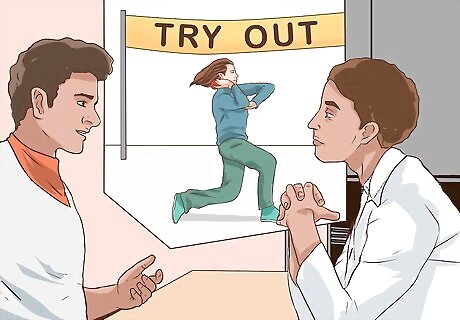
Talk to an admissions counselor. Before you apply anywhere, talk to an admissions counselor from each university. Explain your desire to play on the cricket team and ask them if they have any advice for you. Follow any advice they give you as best you can. Other great information to ask for includes: Information about the tryout process for the cricket team Whether or not the cricket coach would be willing to give you application advice How competitive the cricket tryouts are

Apply to the universities. Apply to each university on your list to give you the best chance of attending one. Each university have different application processes and deadlines. Therefore, visit the university website or talk to an admissions counselor for information on how to apply. Common application components include: A cover letter An essay describing your reasons for applying A transcript from your previous school

Try out for the cricket team. Once you’re admitted into a university, try to get onto the cricket team. Find out when tryouts are being held and attend them. Additionally, talk to the coach about playing on the team. They will be able to give you good advice about playing on the team and will remember you when you attend tryouts. Sometimes tryouts are held before the school year begins. Find out the dates and times of the cricket team tryouts from an admissions counselor or the cricket coach.
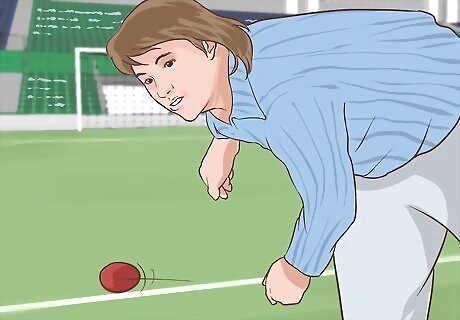
Be persistent. If you don’t make the cricket team, try again next year. In the meantime, practice cricket as often as you can to improve your game. Additionally, work hard in all of your classes to make good grades and focus on finding subjects that you enjoy. Even if you don’t make it onto the cricket team, you’ll end up with a degree from a great university!
Becoming a Professional Player
Play for a club. In order to become a professional player, you must have experience playing for a cricket club. If you’re not currently a member of a club, find a local club to join to gain experience. Once you’re a member, you can be nominated for trials into state borough teams, minor county teams, then county teams.
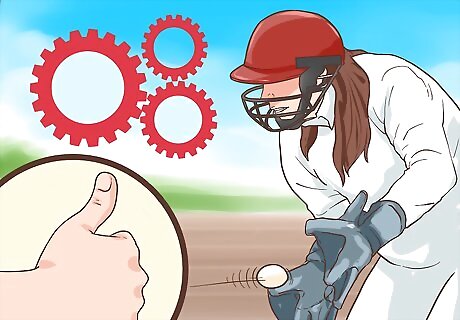
Find a way to stand out. A valuable player is good in many different roles. However, if you want to get noticed, you need to specialize your training to become noteworthy. To do so, base the core of your training around the repeated movements your position requires. For example: If you’re a bowler, practice bowling the ball. If you’re a wicket keeper, practice rising from a crouch quickly and catching the ball. If you’re a batsman, practice hitting the ball.

Join a highly competitive team. This can mean a school team, a semi-professional team, an inter-collegiate team, or a regional team. A competitive team participates in tournaments within their region. These teams will give you important training and help you get noticed by recruiters. You may have to try out for a spot on these teams. If so, practice hard and don’t give up! Try out as many times as you’re allowed. Always show that you’re a good team player. Otherwise, recruiters may not want you on their team, even if you’re very talented.
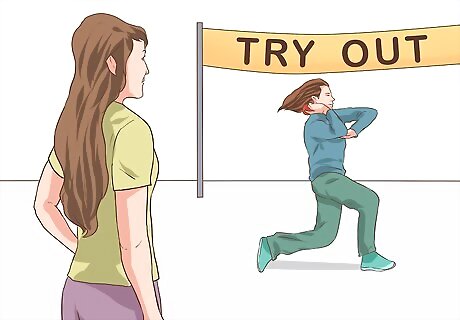
Look for open tryouts. Once you’ve become competitive on a semi-professional level, start looking for open tryouts for your favorite professional teams. Make friends with recruiters and other serious cricket players to be the first to hear about these tryouts. Otherwise, search for open tryouts online or look on your favorite team’s website. Most open tryouts are held before the start of a new season. There will be many, many people at an open tryout. Do your best to stand apart from the crowd by being a team player and performing well.
















Comments
0 comment